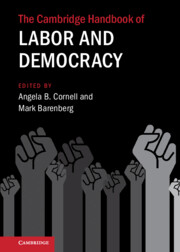Book contents
- The Cambridge Handbook of Labor and Democracy
- The Cambridge Handbook of Labor and Democracy
- Copyright page
- Contents
- Contributors
- Acknowledgments
- Introduction
- Part I Labor and Democracy: Theory and Practice
- Part II History, Politics, and Law
- 5 Sectoral Bargaining in the United States
- 6 The Lever and the Fulcrum
- 7 “Industrial Democracy” in the United States, Past and Present
- 8 Holding On
- 9 Unions and the Democratic First Amendment
- Part III Labor, Diversity, and Democracy
- Part IV Country and Regional Perspectives
- Part V Labor and Democracy Sectoral Case Studies: Platform Workers, Higher Education, and the Care Industry
- Index
- References
8 - Holding On
The Decline of Organized Labor in the USA in Historical Perspective and the Implications for Democracy
from Part II - History, Politics, and Law
Published online by Cambridge University Press: 25 January 2022
- The Cambridge Handbook of Labor and Democracy
- The Cambridge Handbook of Labor and Democracy
- Copyright page
- Contents
- Contributors
- Acknowledgments
- Introduction
- Part I Labor and Democracy: Theory and Practice
- Part II History, Politics, and Law
- 5 Sectoral Bargaining in the United States
- 6 The Lever and the Fulcrum
- 7 “Industrial Democracy” in the United States, Past and Present
- 8 Holding On
- 9 Unions and the Democratic First Amendment
- Part III Labor, Diversity, and Democracy
- Part IV Country and Regional Perspectives
- Part V Labor and Democracy Sectoral Case Studies: Platform Workers, Higher Education, and the Care Industry
- Index
- References
Summary
Opponents of unions have often portrayed them as a threat to democracy.Rather than speaking for workers, they contend, unions were a “special interest” or “third party” who took away workers’ voices, along with their hard-earned money.Reviewing labor’s post-World War II history – particularly the domestic record of the AFL-CIO since its foundation in 1955 – this chapter shows that unions were not a third party, but an important force for democracy.Throughout the post-World War II era, organized labor provided a voice for all working people, not just its members. Unions were a much-needed watchdog, consistently fighting for safer workplaces, higher pay, and workplace democracy. They also gave a stronger voice to working people in politics – and could bring them into the streets. Despite their imperfections, no other organization performed this role in quite the same way.
Information
- Type
- Chapter
- Information
- The Cambridge Handbook of Labor and Democracy , pp. 127 - 144Publisher: Cambridge University PressPrint publication year: 2022
